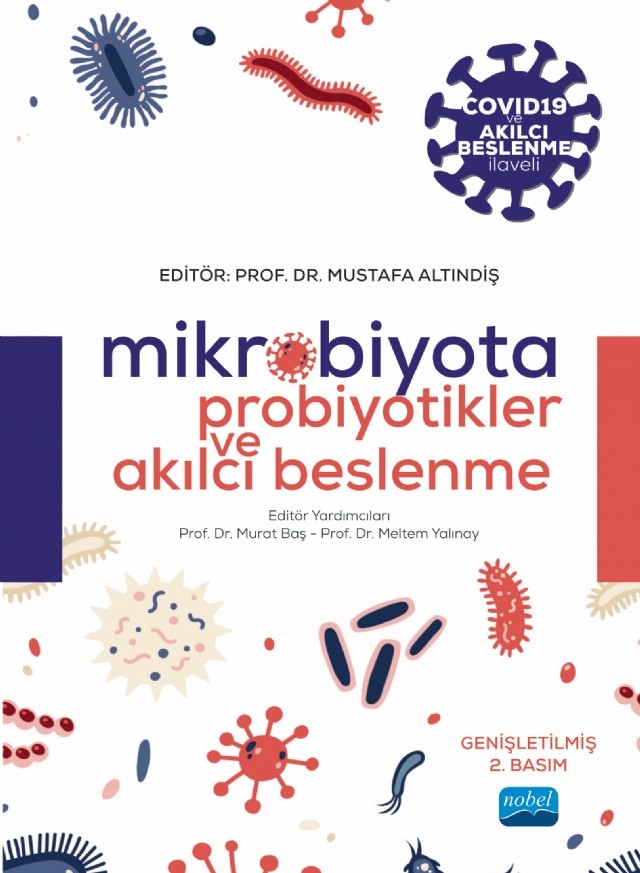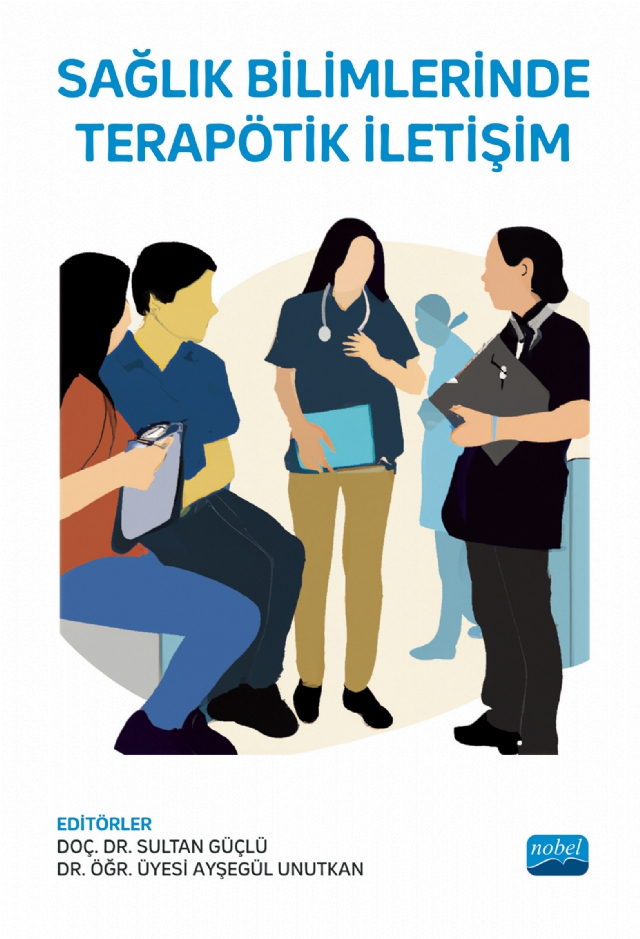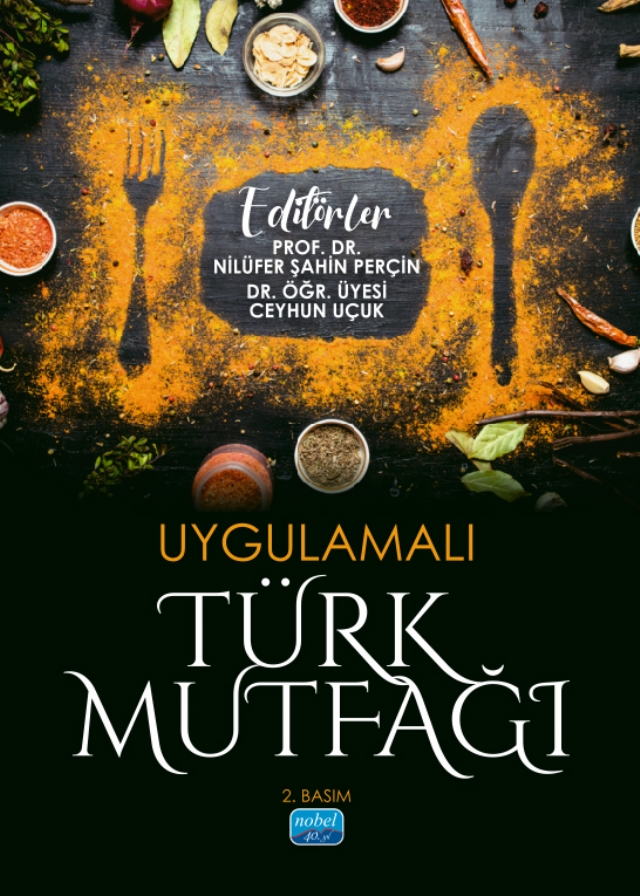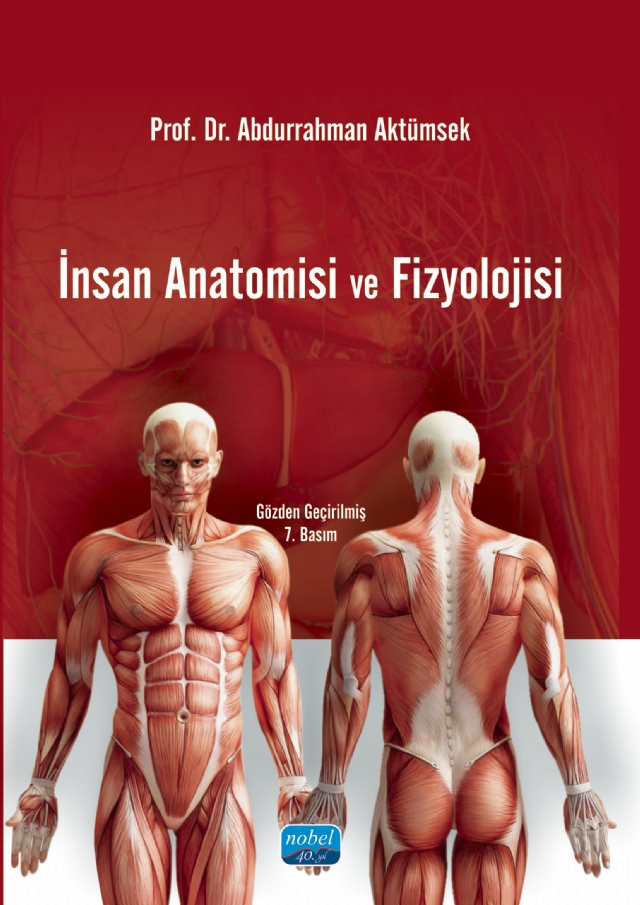Nutrition and Dietetics \ 1-1

In this book, nutritional information is explained along with its physiological and biochemical principles. First, the structure of the nutrients that give energy is given, then their digestion and absorption and how they give energy are revealed. Nutrition during pregnancy and lactation, and nutrition for children, young people, old people and athletes are discussed separately. In fact, vegetarian / vegan nutrition, which has become more widespread today, is also included. In addition, information about nutritional disorders, diseases, food allergies and food poisoning is given. Although it is not included in classical nutrition books, alcohol, which gives energy and even high energy, is also explained in all its aspects.

Interest in the field of gastronomy and culinary arts has increased considerably in recent years. The number of associate, undergraduate and graduate programs, organized competitions, festivals, scientific events and television competition programs continues to increase day by day. In line with these developments, this book, which includes concepts and applications for industrial kitchens, has been prepared by a team of experts in the field, with its innovative content, in order to contribute to the quality education of students in the fields of food and beverage, and to contribute to the scientific and professional knowledge of those who are interested in the field.
Definition and Historical Development of the Kitchen, Terms Used in the Kitchen, Kitchen Planning and Installation, Main Kitchens in the Food and Beverage Industry, Parts of the Kitchen and Working Areas, Human Resources Management in the Food and Beverage Industry, Kitchen Organization in Food and Beverage Businesses, Duties and Qualifications of Kitchen Staff, Used in the Kitchen Equipment and Tools, Management in the Kitchen, Hygiene in the Kitchen, Sanitation and Food Safety, Cost Control in the Kitchen, Guest Complaints and Solution Suggestions Regarding the Kitchen, Waste Management and Recycling in the Kitchen, Information and Communication Technologies in the Food and Beverage Industry.
Definition and Historical Development of the Kitchen, Terms Used in the Kitchen, Kitchen Planning and Installation, Main Kitchens in the Food and Beverage Industry, Parts of the Kitchen and Working Areas, Human Resources Management in the Food and Beverage Industry, Kitchen Organization in Food and Beverage Businesses, Duties and Qualifications of Kitchen Staff, Used in the Kitchen Equipment and Tools, Management in the Kitchen, Hygiene in the Kitchen, Sanitation and Food Safety, Cost Control in the Kitchen, Guest Complaints and Solution Suggestions Regarding the Kitchen, Waste Management and Recycling in the Kitchen, Information and Communication Technologies in the Food and Beverage Industry.

The history of fermented foods goes back to 6000 BC, according to the earliest known records. Since this date, fermented foods have started to be produced and consumed with an increasing interest. Undoubtedly, the most important reason for this is the increasing understanding of the positive effects of fermented foods on human health. It is a fact accepted by the scientific world that fermented products have functional and therapeutic effects, especially since they have antimicrobial, antioxidant, probiotic, cholesterol-lowering and similar effects. Based on this fact, we carried out the study with a large group of writers working at different universities and consisting of expert academics, and we aimed to make it stronger, pioneering and different from similar books in the field.
The beginning of the book is the history of fermentation. Afterwards, fermented foods, which have an important place in our daily life and which we love to consume, are discussed in separate sections and the positive effects of these foods on microbiology, technology and health are included. In the last part of the book, there is information about fermented foods legislation and other fermented foods that are not widely consumed in our country but are frequently consumed abroad. Book; It has been prepared at a level that can appeal to academics and students who are studying in this field, as well as to people who do not do academic work.
The beginning of the book is the history of fermentation. Afterwards, fermented foods, which have an important place in our daily life and which we love to consume, are discussed in separate sections and the positive effects of these foods on microbiology, technology and health are included. In the last part of the book, there is information about fermented foods legislation and other fermented foods that are not widely consumed in our country but are frequently consumed abroad. Book; It has been prepared at a level that can appeal to academics and students who are studying in this field, as well as to people who do not do academic work.

If you;
• Have bloating, indigestion, gas after meals,
• Find yourself in front of the refrigerator every time you feel depressed,
• Deal with gastrointestinal problems such as constipation and diarrhea,
• Have difficulty in falling asleep or sleep uninterruptedly,
• Have skin problems such as acne, eczema, rash,
• Wake up tired in the morning,
• Have muscle and joint pain,
• Feel full and tired after every meal,
• Crave for sweet and salty foods,
• Have low mood and energy,
• Or if your doctor recommends
You may need “Elimination Diet”
While this book will guide you through the stages you can go through the elimination diet, it will also guide you with delicious and nutritious elimination diet recipes. You will discover the right food combinations, how to eat the rainbow, and how to complete the micro and macro nutrients in one plate, as well as healthy cooking techniques.
This book also provides a guideline for well-aging. You will enjoy to learn the basic steps for a sustainable healthy life and to become the best version of your age.
Each of us, as human beings, are very unique and very precious.
We need to put the oxygen mask first on our face.
The elimination diet is a special period, where we start to wear this oxygen mask, take care of ourselves and be compassionate to ourselves more.
Are you ready for this journey to take care of yourself?
AS…
ONE PLATE CHANGES,
A HUMAN CHANGES.
A HUMAN CHANGES,
A FAMILY CHANGES.
• Have bloating, indigestion, gas after meals,
• Find yourself in front of the refrigerator every time you feel depressed,
• Deal with gastrointestinal problems such as constipation and diarrhea,
• Have difficulty in falling asleep or sleep uninterruptedly,
• Have skin problems such as acne, eczema, rash,
• Wake up tired in the morning,
• Have muscle and joint pain,
• Feel full and tired after every meal,
• Crave for sweet and salty foods,
• Have low mood and energy,
• Or if your doctor recommends
You may need “Elimination Diet”
While this book will guide you through the stages you can go through the elimination diet, it will also guide you with delicious and nutritious elimination diet recipes. You will discover the right food combinations, how to eat the rainbow, and how to complete the micro and macro nutrients in one plate, as well as healthy cooking techniques.
This book also provides a guideline for well-aging. You will enjoy to learn the basic steps for a sustainable healthy life and to become the best version of your age.
Each of us, as human beings, are very unique and very precious.
We need to put the oxygen mask first on our face.
The elimination diet is a special period, where we start to wear this oxygen mask, take care of ourselves and be compassionate to ourselves more.
Are you ready for this journey to take care of yourself?
AS…
ONE PLATE CHANGES,
A HUMAN CHANGES.
A HUMAN CHANGES,
A FAMILY CHANGES.

In this book, which aims to bring together the secrets of healthy life and related researches of the future in a comprehensive and encyclopedic way, almost all the issues related to the microbiota in the clinic are mentioned. In addition, information on probiotics and the use of probiotics in clinical spectra is presented in their latest updated versions, while different application areas of probiotics and rational nutrition are listed one after the other.
Although the effects of microbiota and probiotics on health and diseases are known, there are still many questions to be answered. Although studies on microbiota have been started in Turkey, infrastructure and standardization problems have not been resolved and there is a need for regulation in many aspects. Because this area has a strategic importance for our country. Although it is changing rapidly, our eating habits are still different from Western countries. Therefore, it is likely that we have a unique intestinal bacterial structure of our own. With the studies to be done on this subject, special diagnosis and treatment methods can be developed for us. The Microbiota, Probiotics and Rational Nutrition book, in which the latest information, experiences and the point reached are discussed by teachers working in different fields of expertise, will also be instrumental in sharing and planning on what can be done in Turkey, who will take part in what way, and how to work.
With the hope and hope that it will be useful to all its readers...
Although the effects of microbiota and probiotics on health and diseases are known, there are still many questions to be answered. Although studies on microbiota have been started in Turkey, infrastructure and standardization problems have not been resolved and there is a need for regulation in many aspects. Because this area has a strategic importance for our country. Although it is changing rapidly, our eating habits are still different from Western countries. Therefore, it is likely that we have a unique intestinal bacterial structure of our own. With the studies to be done on this subject, special diagnosis and treatment methods can be developed for us. The Microbiota, Probiotics and Rational Nutrition book, in which the latest information, experiences and the point reached are discussed by teachers working in different fields of expertise, will also be instrumental in sharing and planning on what can be done in Turkey, who will take part in what way, and how to work.
With the hope and hope that it will be useful to all its readers...

Communication is an indispensable part of life, which is at the heart of any human relationship. Every individual deserves to be treated with dignity and respect. Based on this fact, therapeutic communication is an effective and empathetic communication method, where personal space, privacy, confidentiality and trust are provided, information meets compassion, which can be used to increase the delivery/quality of health services and to increase patient/client satisfaction. Health professionals should know how to communicate with patients/clients and their relatives while evaluating patients/clients; It is very important for the individuals with whom they communicate to realize that they are also human beings with their own values and feelings. This book will be a guide for healthcare professionals and students, who are future healthcare professionals, to develop their therapeutic communication skills by approaching their patients/clients with a holistic perspective.

Keeping the Turkish cuisine alive is extremely important in terms of our taste, health, culture, tourism sector and the promotion of the country abroad. Our traditional dishes have evolved over centuries of skill and knowledge. While adapting them to today's conditions, it is necessary to stay true to their essence and to make them with traditional materials as much as possible. Only then will we reach their true flavors. Without being aware of this and without learning how to cook traditional dishes properly, "I did it, it's done." Attempting to create artificial creativity in the form of a kitchen will cause the kitchen to disappear, not live. This book has been prepared with the contribution of the gastronomy departments of 23 universities and presents the dishes, desserts, drinks and winter preparations from all over Anatolia with detailed explanations. It is a book that understands that food gains value along with their culture. These menu examples start with a section describing the historical development of the cuisine, and in more than twenty sections with names such as soups, meat dishes, stuffed meat dishes, menu samples, it also gives information such as their history, cultural contexts, and geographical features.
Priscilla Mary Ray - Food Historian
I believe that this innovative work, in which theory and practice are brought together, will be very useful for the correct transmission of Turkish cuisine.
Ahmet DEDE - Michelin Star Chef
I believe that this study will be very useful at a time when we need well-researched, educational and academic Turkish cuisine resources. Well done to all the hard work and knowledge.
Somer SİVRİOĞLU - Efendy/Anise Restaurant Chef&Owner, Masterchef Turkey Jury
Priscilla Mary Ray - Food Historian
I believe that this innovative work, in which theory and practice are brought together, will be very useful for the correct transmission of Turkish cuisine.
Ahmet DEDE - Michelin Star Chef
I believe that this study will be very useful at a time when we need well-researched, educational and academic Turkish cuisine resources. Well done to all the hard work and knowledge.
Somer SİVRİOĞLU - Efendy/Anise Restaurant Chef&Owner, Masterchef Turkey Jury
